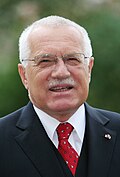Jan Ruml | |
|---|---|
 | |
| Minister of the Interior | |
| In office 2 July 1992 –7 November 1997 | |
| Prime Minister | Václav Klaus |
| Preceded by | TomášSokol |
| Succeeded by | Jindřich Vodička |
| Senator from Prague 6 | |
| In office 21 November 1998 –21 November 2004 | |
| Preceded by | Jan Koukal |
| Succeeded by | Karel Schwarzenberg |
| Member of the Chamber of Deputies | |
| In office 1 June 1996 –19 June 1998 | |
| Member of the Federal Assembly | |
| In office 6 June 1992 –31 December 1992 | |
| Leader of the US–DEU | |
| In office 22 February 1998 –1 December 1999 | |
| Preceded by | Position established |
| Succeeded by | Karel Kühnl |
| Personal details | |
| Born | 5 March 1953 [1] |
| Political party | OF (1989–1991) ODS (1991–1998) US–DEU (1998–2004) SZ (2010–2014) |
| Alma mater | University of West Bohemia |
Jan Ruml (born 5 March 1953 in Prague [1] ) is a Czech politician who was interior minister from 1992 to 1997.

